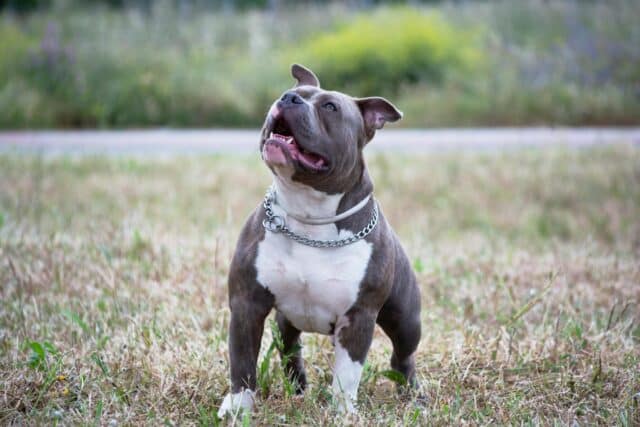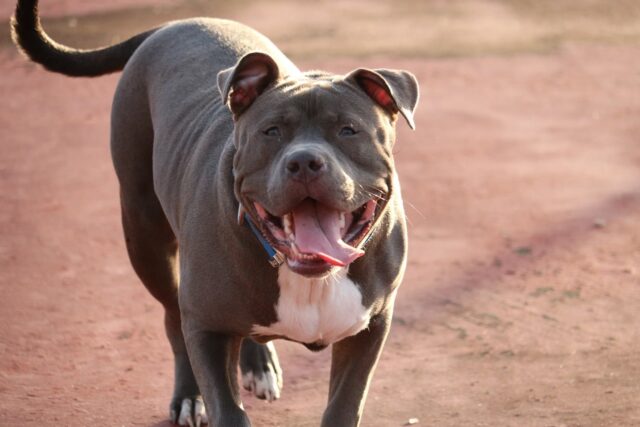With their loyal nature and boundless energy, pit bulls are beloved companions known for their tenacity and spirit. But like all dogs, they, too, eventually reach their golden years. When exactly does a pit bull enter its senior phase? This question often perplexes owners, who may find it hard to believe their sprightly pups could ever slow down. Generally, a pit bull is considered to have reached old age, around 7 to 9 years old. However, just as with humans, this can vary based on health, lifestyle, and genetics. Some pit bulls maintain their zest for life well into their later years, while others may start showing signs of aging earlier. Let’s delve into the stages of a pit bull’s life and explore the quirky signs that your furry friend might be entering their senior phase.

1. The Puppy Years: The Start of Something Wild
A pit bull’s first year is a whirlwind of energy and curiosity. These rambunctious pups are full of life, often mistaken for little tanks with their muscular builds and fearless attitudes. Owners can expect lots of playful antics, from chewing on everything in sight to mastering the “zoomies” around the house. It’s a time of growth and learning, both for the dog and the owner, as they establish a lifelong bond.
2. The Prime Years: Muscle and Mischief
From ages 2 to 6, pit bulls are in their prime. These years are marked by peak physical fitness and high energy levels. Your pit bull is likely to be the life of the party, whether at the dog park or during a game of fetch. This is also the period where they showcase their impressive strength and agility, often surprising you with their ability to leap onto the highest surfaces or pull you down the street during walks. Their personality shines during these years, and they may develop strong preferences for certain toys, activities, or TV shows!
3. The Middle Ages: Slowing Down, But Not Out
Around age 6 or 7, you might notice your pit bull starting to slow down a bit. They may not be as eager to chase after that ball for the hundredth time, preferring instead to lounge and enjoy more leisurely activities. This is also when some grey hairs might appear, giving them a distinguished look. Don’t be fooled, though—they still have plenty of energy and love to give. It’s just that they’ve become a bit more selective about how they spend it!
4. The Senior Years: Wisdom and Whiskers
When a pit bull reaches 7 to 9 years old, they’re generally considered to be in their senior years. This stage is often marked by a softer demeanor; they might become more affectionate and enjoy cuddling more than ever. You may notice some stiffness in their joints or a decreased overall activity level. However, senior pit bulls still have a lot of life left in them. They continue to be playful and loving, often showing a new kind of wisdom and patience that comes with age.
5. Golden Oldies: Cherishing Every Moment
As pit bulls age beyond 9 years, they truly enter the golden years of their lives. This is a time for slower walks, extra belly rubs, and perhaps a little more napping than usual. Owners should be mindful of their senior dog’s health, looking for any signs of discomfort or illness. Regular vet check-ups and a diet tailored to their changing needs can help them remain healthy and happy. These golden oldies may be a bit slower, but their love for you remains as strong as ever.
In the end, each stage of a pit bull’s life brings its own joys and challenges. From the boundless energy of puppyhood to the wise and gentle nature of old age, pit bulls are remarkable companions at every turn. While they may age faster than we’d like, every moment spent with them is a gift. So, whether your pit bull is a spry pup or a seasoned senior, cherish every bark, wag, and cuddle. After all, the love of a pit bull only grows stronger with time, and that’s something truly worth celebrating.
Frequently Asked Questions Someone Might Have About Their Aging Pit Bull

1. How can I tell if my pit bull is entering their senior years?
Pit bulls typically start showing signs of aging around 7 to 9. Common indicators include decreased energy levels, graying fur around the muzzle and face, and a more laid-back demeanor. You may also notice them becoming stiffer or slower, especially after exercise or first thing in the morning. Changes in weight, either gaining or losing, can also be a sign. Additionally, they might start experiencing hearing or vision loss, manifesting as being less responsive or bumping into things. It’s important to monitor these changes and consult your vet for a thorough check-up to ensure these are normal signs of aging, not symptoms of a health issue.
2. What are common health issues in aging pit bulls?
Aging pit bulls can be prone to several health issues, including arthritis, which causes joint pain and stiffness. Dental problems are also common, leading to bad breath, difficulty eating, or loss of teeth. They may be more susceptible to heart disease, kidney issues, and thyroid imbalances. Skin problems like dry skin or infections can occur due to a weakened immune system. Additionally, pit bulls may develop lumps or tumors, which could be benign or malignant, so it’s crucial to get them checked by a vet. Vision and hearing loss are also common as they age. Regular veterinary check-ups are essential to detect and manage these health issues early on.
3. How should I adjust my pit bull’s diet as they age?
As pit bulls age, their nutritional needs change. They may require fewer calories due to decreased activity levels, helping to prevent obesity, which can exacerbate joint issues like arthritis. Switching to a senior dog food formula is often recommended, as these formulas are lower in calories but higher in essential nutrients like protein and fiber. Senior diets also typically contain added supplements such as glucosamine and chondroitin for joint health, and antioxidants to support the immune system. It’s important to consult your vet to determine the best diet for your aging pit bull, especially if they have specific health conditions requiring dietary adjustments.
4. How much exercise does an aging pit bull need?
While aging pit bulls may not require as much intense exercise as they did in their younger years, regular physical activity is still crucial to maintain their health. Aim for at least 30 minutes of moderate exercise each day, such as walking, gentle play, or swimming, which is easy on the joints. The key is to keep them active without overexerting them. Pay attention to their energy levels and watch for signs of fatigue or discomfort, adjusting the intensity and duration of exercise accordingly. It’s also beneficial to engage them in mental stimulation activities, like puzzle toys or training exercises, to keep their minds sharp.
5. How can I help my pit bull manage arthritis?
Arthritis is a common issue in aging pit bulls and can be managed through a combination of diet, exercise, and medication. Ensure they maintain a healthy weight to reduce stress on their joints. Regular, low-impact exercise like swimming can help maintain mobility without causing pain. Providing a comfortable orthopedic bed can also alleviate joint pain. Your vet may recommend glucosamine, chondroitin, or omega-3 fatty acids supplements. In more severe cases, anti-inflammatory medications or pain relievers may be necessary. Physical therapy and acupuncture are other options that can provide relief. Always consult with your vet before starting any new treatment.
6. Should I be concerned about my pit bull’s lumps and bumps?
As pit bulls age, they may develop lumps and bumps on their body. While many of these are benign, such as lipomas (fatty tumors), it’s important to have any new growths checked by a vet. Some lumps could be cysts, abscesses, or malignant tumors, like mast cell tumors, which are more serious and require immediate attention. A vet can perform a biopsy or fine needle aspiration to determine the nature of the lump. Early detection and treatment are crucial, especially if the lump is cancerous. Regularly checking your dog’s body for any changes and scheduling annual vet visits are key practices for early detection.
7. How can I keep my aging pit bull comfortable at home?
To keep your aging pit bull comfortable, consider making some adjustments around the home. Provide a supportive orthopedic bed to help relieve joint pain and ensure they have a warm, draft-free space to rest. If they struggle with stairs or getting onto furniture, consider ramps or steps to help them access their favorite spots. Keep their food and water bowls comfortable to reduce strain on their neck and joints. Maintain a calm and quiet environment, as senior dogs can become more sensitive to noise and stress. Regular grooming and nail trims can also help them feel more comfortable.
8. What should I do if my pit bull loses hearing?
If your pit bull is losing their hearing, there are several ways to help them adjust. Use hand signals or gestures for commands, as visual cues can be more effective than verbal ones. It’s important to approach them from the front to avoid startling them. Keep their environment consistent, so they feel secure even if they can’t hear well. Vibration, such as tapping the floor or gently tapping their body, can help get their attention. Additionally, ensure they are always on a leash in unfamiliar areas, as they may not hear dangers like approaching vehicles. Consult your vet for further advice.
9. How do I manage my pit bull’s dental health as they age?
Maintaining good dental health in aging pit bulls is crucial to prevent issues like gum disease, tooth decay, and bad breath. Regular brushing with dog-specific toothpaste is ideal, but dental chews and toys designed to clean teeth can also help. Schedule annual dental check-ups with your vet, who can perform professional cleanings and check for any dental issues. A balanced diet with kibble or dental treats can help reduce plaque buildup. Avoid giving them hard bones or objects that could crack their teeth. Early detection of dental problems can prevent more serious health issues later on.
10. How can I mentally stimulate my aging pit bull?
Keeping your aging pit bull mentally stimulated is important for their overall well-being. Puzzle toys and interactive feeders can challenge their problem-solving skills and keep them engaged. Teach them new tricks or reinforce old ones to keep their minds active. Scent games, like hiding treats around the house, can be fun and stimulating. Socialization with other dogs or people can provide mental stimulation if they enjoy it. Consider shorter but more frequent training sessions to avoid tiring them out. Regularly rotating their toys can also keep their interest piqued. Engaging their mind is as important as physical exercise for their health.
 Toledo, United States.
Toledo, United States.
